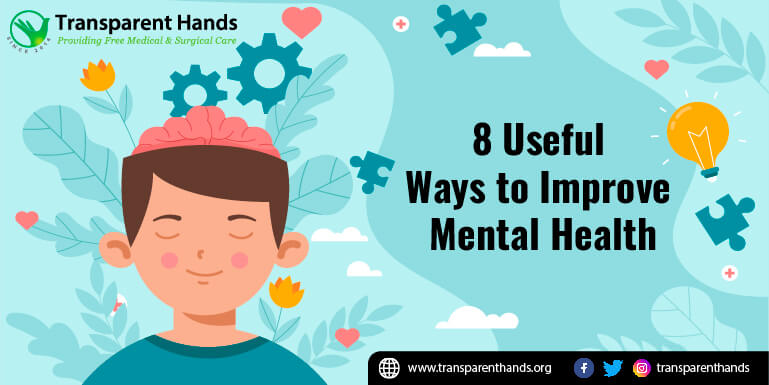8 Useful Ways to Improve Mental Health

Mental health is a crucial component of our overall well-being, and it is vital to prioritize it as we navigate the challenges of life. With the fast-paced and often stressful demands of modern life, it’s easy to feel overwhelmed and experience mental health challenges. However, there are many ways we can take care of our mental health and improve our well-being.
In this article, we will explore various ways to improve mental health, including practices that are backed by research and proven to be effective. From exercise to mindfulness, diet, and more, we will take a comprehensive look at how you can take proactive steps to promote mental wellness and build resilience to life’s challenges.
The Importance of Mental Health
Before delving into ways to improve mental health, it is essential to understand the importance of a healthy mind. Mental health is a state of well-being in which an individual can realize their own abilities, cope with the normal stresses of life, work productively, and contribute to their community. It is a critical component of our overall health and well-being, as it affects our thoughts, behaviors, and emotions.
Mental health disorders, such as anxiety, depression, and bipolar disorder, can have a severe impact on an individual’s ability to function and lead a healthy life. However, even those who do not experience a diagnosed mental illness can benefit from taking care of their mind. Just like we prioritize our physical health through exercise, sleep, and nutrition, we can also prioritize our mental health by implementing various strategies and lifestyle changes.
How to Improve Mental Health?
1. Exercise
Exercise is a powerful tool to promote mental health. Regular workouts can reduce symptoms of depression and anxiety, boost self-esteem, and improve cognitive function. It helps release endorphins, which are neurotransmitters that reduce the perception of pain and promote feelings of pleasure and happiness. Engaging in physical activity doesn’t have to mean hitting the gym – activities such as walking, swimming, yoga, or dancing can be equally effective in improving mental well-being.
2. Mindfulness
Mindfulness is the practice of being present and fully engaged in the current moment. It is one of the essential practices to improve mental health. It involves paying attention to your thoughts and feelings without judgment. Mindfulness has been found to be effective in reducing symptoms of anxiety and depression, improving sleep, and promoting overall well-being. Practices such as meditation, deep breathing, and yoga can help you develop mindfulness skills and incorporate them into your daily routine.
3. Healthy Diet
A healthy diet is inevitable for mental health, just as it is for physical health. Research has shown that diets high in fruits, vegetables, whole grains, and lean proteins can reduce the risk of depression and anxiety. Consuming processed and sugary foods has been linked to a higher risk of depression and anxiety. Additionally, maintaining a healthy weight through diet can also have a positive impact on mental health.
4. Social Support
Strong social connections are crucial to improve mental health. Maintaining close relationships with friends and family can help reduce stress, increase feelings of happiness and security, and provide a support system during difficult times. Joining social groups or participating in community activities can also provide opportunities for social connection and support.
5. Sleep
Sleep is an essential component to have a healthy mind. Lack of sleep or poor quality sleep can have a severe impact on mood, cognitive function, and overall well-being. Chronic sleep deprivation has been linked to numerous mental health conditions, including depression, anxiety, and bipolar disorder. Adults should aim to get between seven and nine hours of sleep each night. Creating a bedtime routine, avoiding caffeine and screens before bed, and creating a comfortable sleep environment can all contribute to better sleep quality.
6. Limit Screen Time
Excessive use of electronic devices, including social media, has been linked to increased rates of depression, anxiety, and other mental health conditions. Limiting screen time, setting boundaries around device use, and engaging in activities that don’t involve technology can reduce stress and improve mental health significantly and help lead a life free of unnecessary stress on the mind.
7. Practice Gratitude
Focusing on the positive aspects of life and expressing gratitude for them can increase happiness and well-being. This can be achieved through practices such as keeping a gratitude journal, expressing appreciation to others, and focusing on the present moment.
8. Seek Professional Help
If symptoms of mental illness persist, despite efforts to improve mental health through self-care, seeking professional help can be an important step in recovery. Mental health professionals, such as therapists and psychiatrists, can provide support, guidance, and treatment for mental health conditions.
Conclusion
Taking care of our mind is crucial for our overall well-being. Implementing strategies such as exercise, mindfulness, healthy eating, social support, and good sleep hygiene can help reduce the risk of mental health disorders and promote resilience to life’s challenges. It’s essential to prioritize mental health and incorporate these practices into our daily routines. It’s important to remember that the process to improve mental health goes on for life and that taking care of your mind should be a regular and ongoing practice.










Leave Your Comments